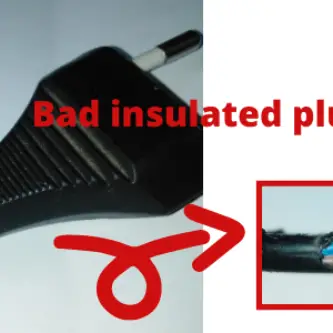Extension cords are a convenient way to access electricity from a distance. They provide flexibility and allow you to use electrical devices in places where there are no power outlets nearby.
However, extension cords are not indestructible and can be damaged easily, especially if they get wet.
In this article, we will explore what happens if an extension cord gets wet and what precautions you can take to avoid potential hazards.
What Happens if an Extension Cord Gets Wet?
When an extension cord gets wet, the water can seep into the insulation and damage the wire.
Wet extension cords are a serious safety hazard as they can cause electrocution, fires, and property damage. Here are some of the effects of water damage on extension cords:
- Electrical Shorts: Water can cause electrical shorts in extension cords. An electrical short occurs when the current bypasses its normal path and takes a shortcut to the ground. This can happen if the water reaches the wire connections, causing a spark and short circuit.
- Insulation Damage: Water can damage the insulation that protects the wires from touching each other. When the insulation is damaged, the wires can touch, leading to electrical shorts, fires, and electrocution.
- Corrosion: Water can cause corrosion in the metal components of the extension cord, such as the prongs and connectors. Corrosion can weaken the cord, making it more prone to damage.
- Fire Hazard: Wet extension cords are a fire hazard, especially if the cord is still plugged in. Water can cause sparks and short circuits that can ignite flammable materials, leading to fires.
- Electrocution Hazard: Water conducts electricity, and if the extension cord is wet, it can become a conductor, leading to electrocution if touched.
How to Dry a Wet Extension Cord?
If your extension cord gets wet, it’s important to dry it as soon as possible. Here are the steps to follow:
- Unplug the Cord: First, unplug the extension cord from the power source.
- Check for Damage: Inspect the cord for any damage, including cracks, cuts, or other signs of wear and tear. If you find any damage, do not use the cord and replace it immediately.
- Dry the Cord: Using a dry towel, gently pat the cord to remove any excess water. Do not use a hairdryer or any other heating device to dry the cord, as this can damage the insulation.
- Air Dry: Hang the cord in a dry, well-ventilated area and let it air dry completely before using it again.
Precautions to Avoid Wet Extension Cords
Preventing your extension cord from getting wet is the best way to avoid potential hazards. Here are some precautions you can take:
- Keep Cords Indoors: Avoid using extension cords outdoors in wet weather conditions, as water can damage the cord and cause electrical hazards.
- Use Weatherproof Cords: If you must use an extension cord outdoors, use a weatherproof cord that is rated for outdoor use.
- Store Cords Properly: Store extension cords in a dry place when not in use. Do not leave them outside, where they can be exposed to the elements.
- Inspect Cords Regularly: Check your extension cords regularly for any signs of wear and tear, including frayed wires, cracks, or cuts. Replace damaged cords immediately.
- Do Not Overload Cords: Overloading an extension cord can cause overheating, leading to fires and electrical hazards. Only use extension cords for their intended purpose and avoid plugging multiple devices into one cord.
Can an Extension Cord be Left in the Rain?
Leaving an extension cord in the rain is not recommended as it can cause damage to the cord and create a safety hazard.
Water can seep into the insulation and damage the wires, leading to electrical shorts, fires, and electrocution.
Additionally, leaving an extension cord in the rain can cause the prongs and connectors to corrode, weakening the cord and making it more prone to damage.
It’s important to keep extension cords dry and protected from the elements to ensure their safe and efficient operation.
If you must use an extension cord outdoors, make sure to use a weatherproof cord that is rated for outdoor use.
Always unplug the cord and store it in a dry place when not in use. Inspect the cord regularly for any signs of damage, and replace it immediately if you notice any wear and tear.
conclusion
In summary, it’s not advisable to leave an extension cord in the rain as it can cause damage to the cord and create a safety hazard.
Taking the necessary precautions to keep extension cords dry and protected can help ensure their safe and efficient operation.
you work With Electricity! Don’t leave empty-handed!
Looking to stay ahead of the game in the world of electrical engineering? Subscribe to my YouTube channel and gain access to exclusive content you won’t find anywhere else!
The staff I recommend (Amazon Affiliate Links to products I believe are high quality):
- Economy 120 Volt/60Hz AC Power Source – Step-Down Voltage & Frequency Converters 1800W
- UNI-T Digital Multimeter Tester UT139C
- 50-Amp Extension Cord for RV “100ft”
- Voltage Stabilizer 110/220v
- Hair Dryer “best selling“
- TOSHIBA EM131A5C-BS Countertop Microwave Ovens
Disclaimer: This contains affiliate links to Amazon products. I may earn a commission for purchases made through these links.

